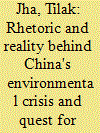|
|
|
Sort Order |
|
|
|
Items / Page
|
|
|
|
|
|
|
| Srl | Item |
| 1 |
ID:
132677


|
|
|
|
|
| Publication |
2014.
|
| Summary/Abstract |
In this paper we analyze the effect of regional and municipal measures for promoting energy transition on citizen attitudes and behavior. We compare one township that has successfully implemented a comprehensive and systematic energy-saving program (the so-called e5 program) with a township without such a program. The results indicate that despite the program×s ambitious aims, e5 implementation has almost no impact on citizen attitudes and behavior. In fact, there are some signs that it might even have slight negative side effects.
|
|
|
|
|
|
|
|
|
|
|
|
|
|
|
|
| 2 |
ID:
132617


|
|
|
|
|
| Publication |
2014.
|
| Summary/Abstract |
Ports are characterised by the geographical concentration of high-energy demand and supply activities, because of their proximity to power generation facilities and metropolitan regions, and their functions as central hubs in the transport of raw materials. In the last decades the need to better understand and monitor energy-related activities taking place near or within the port has become more apparent as a consequence of the growing relevance of energy trades, public environmental awareness and a bigger industry focus on energy efficiency. The uptake in the port sector of innovative technologies, such as onshore power supply, or alternative fuels, such as LNG, and the increasing development of renewable energy installations in port areas, also calls for more attention to energy matters within port management.
So far, however, few port authorities have actively pursued energy management strategies. The necessity for port authorities to actively manage their energy flows stems from their efforts to plan, coordinate and facilitate the development of economic activities within the port, and as a consequence of the heavier weight that sustainability is given within the port management strategies.
Through the analysis of the experiences of two European ports, Hamburg and Genoa, that have already attempted to coordinate and rationalise their energy needs, this paper will argue that for the ports of the future active energy management can offer substantial efficiency gains, can contribute to the development of new alternative revenue sources and in the end, improve the competitive position of the port.
|
|
|
|
|
|
|
|
|
|
|
|
|
|
|
|
| 3 |
ID:
127905


|
|
|
|
|
| Publication |
2014.
|
| Summary/Abstract |
A common finding in behavioural economics is that people often procrastinate, i.e., keep postponing planned tasks or decisions that require effort to execute. The effect of procrastination on inter-temporal energy choice behaviours could be even more serious because energy is an abstract, invisible and intangible commodity. This paper uses a web survey to investigate how people's procrastination propensity and environmental awareness affect their heating-energy-saving behaviours. The results indicate that people who state that they have a higher tendency to procrastinate are significantly less likely to have engaged in most of the heating energy-saving activities, especially regarding larger purchases or investments in equipment and the insulation of doors and windows. I also found a positive relationship between environmental awareness and engaging in everyday energy-saving activities such as reducing the indoor temperature. The findings suggest that measures aimed at reducing procrastination are needed to realise energy-saving potential. It is important to find ways to either bring future benefits closer to the present or to magnify the costs of delayed action. For example, one can employ certain feedback systems and commitment devices to make current gains and future costs more visible or tangible.
|
|
|
|
|
|
|
|
|
|
|
|
|
|
|
|
| 4 |
ID:
129683


|
|
|
|
|
| Publication |
2014.
|
| Summary/Abstract |
An annual survey quoted by China Daily on 24 January 2014 said that more than 30 percent of young Chinese counted environment as a factor while choosing their study destination- up nearly 10 percent than a year ago. That could be symbolic of environmental awareness or panic, or simply helplessness at the state of environment in China. However, China need to grow fast requires it to produce cheap coal energy the primary reason causing all sorts of environmental problem by polluting air- in constantly growing amount. Thus, even as China emerge as a top renewable energy investor and producer while ramping up the efforts to lessen dependence on coal, the quest to ensure reliable energy security is not going to be easy. These constraints agencies seem to have even the Chinese government's genuine effort regarding environment being doubted.
|
|
|
|
|
|
|
|
|
|
|
|
|
|
|
|
|
|
|
|
|